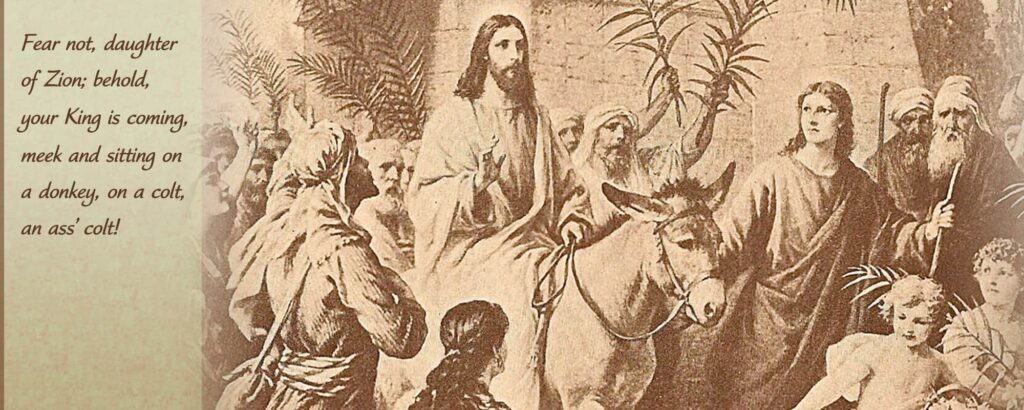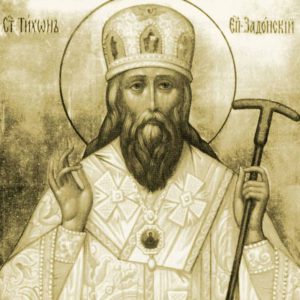
24 SIGNS OF PRIDE, AND HOW TO ACQUIRE HUMILITY
The book Journey to Heaven by Saint Tikhon of Zadonsk is quoted extensively in this post (Chapter 7, "Pride" from , pp. 73-76).
Today, we see the Lord going voluntarily to His passion, riding humbly a lowly donkey. Thus, we are given the opportunity to reflect on the virtue of humility and the passion of pride. But let us first reflect briefly on the events commemorated on this day.
The Lord enters Jerusalem five days before the feast of the Passover, and “dramatically manifests Himself as the Messiah” 1 by fulfilling the prophecy found in the book of Zachariah:
Fear not, daughter of Zion; behold, your King is coming, [humble and] sitting on a donkey, on a colt, an ass’s colt! (Zach. 9:9)
The hymnology of the Church reflects the unassuming entry of the Lord:
“Today the Word and co-eternal Son of God the Father, whose throne is the heaven and whose footstool is the earth, humbles Himself and comes to Bethany, seated on a dumb beast, on a foal.” 2
Another hymn likewise reflects on the low-key manifestation of the Lord:
“Behold your King comes to you: He is meek and brings salvation, and He rides upon the colt of an ass, the foal of a beast of burden.” 3
“Our Lord Jesus Christ,” writes a Father of the Church,
“wishing to show us the way of eternal life and holiness, was clothed in humility during His whole life in the flesh. Thus holy humility ought truly to be called a divine virtue.” (St. Philotheos of Sinai4)
In fact in inviting us to imitate Him the Lord says: “Learn from Me, for I am gentle and humble in heart” (Mt. 11:29). He also gave us this rule: “Whoever exalts himself will be humbled, and whoever humbles himself will be exalted.” (Mt. 23:12) Let us then humble ourselves, for unless we strive to do this we will turn against us Jesus Christ, who “opposes the proud, but gives grace to the humble.” (James 4:6)
PRIDE
Pride is such a vice that a person possessed with it does not know it and therefore will not admit that he is prideful. “Pride is a most abominable sin, but hardly anyone recognizes it since it is hidden deep in the heart,” writes St. Tikhon of Zadonsk.5 Pride stems from an inadequate knowledge of ourselves, of who we are, and of what is our proper place and position, especially vis-à-vis God. “Not knowing one’s self is the beginning of pride. This ignorance blinds a man, and thus he becomes full of pride,” writes once more St. Tikhon.6
It becomes apparent, then, that it is extremely difficult to rid ourselves from this vice, and in any case to work towards eradicating it from our heart, since we do not realize that we have it in the first place. How can we go to the doctor and be cured of the disease we suffer from, when we do not know that we have the disease. St. Tikhon presents us with certain signs, or markings, so that we can examine ourselves if we display these symptoms; if we do, then we know we have the disease. So, let us reflect carefully on these signs:
“Pride is known by its deeds as a tree is known by its fruits. But let us see what are the fruits of the bitter seed of pride [and we will present here only a few, with a brief commentary]:
- A proud man seeks honor, glory, and praise by every means. He always desires to appear as something, and to direct, command, and rule others. But he is powerfully angered and embittered at whoever may prevent his desire.
“Honor, glory, and praise.” The wretched soul of a proud man feeds on these and craves insatiably for them. The Pharisees sought the πρωτοκαθεδρίες, the places of honor - they demanded them. That’s why the proud man loves power, authority. And if he does not get what he wants, he is resentful, and holds rancor and malice.
- He complains, he is displeased, and he curses when deprived of honor and leadership. ‘What have I done wrong? Why am I at fault? Is this what my labors and service merit?’[...]
- Out of his self-will he interferes in the affairs of others. He desires to direct everyone and everywhere, though he himself does not know what he is doing, so greatly is he blinded by pride.
- He boasts of himself shamelessly and exalts himself. ‘I did thus and so. I rendered such and such service to society.’ O man! You enumerate your services, but why do you not mention your shortcomings? While it is shameful for you to proclaim those, you should also be ashamed to praise yourself.
- He looks down on and humiliates other people. ‘He is a base man, he is useless,’ and so on. O man! He is a man just as you are, for we are all men. He is a sinner, yes, but I think that you cannot deny that name either. He transgressed in something, or is a sinner, but you, too, [are a sinner] in another way, or perhaps in the same way. For all have sinned, and come short of the glory of God (Rom. 3:23).
- He does not submit, he does not obey his authorities ... The proud have a stiff and unbending neck. They always wish to establish and execute the will of their desires.
- The goods that they have they ascribe to themselves, to their own efforts and labors, and not to God. O man! What can you have of your own self, who came naked out of your mother’s womb? What can you have should God, the source of all good, not give it to you? What can our effort and labor accomplish without His help, Who alone is able to do all things, and without Whom everyone is as nothing, as a shadow without a body?
- He greatly dislikes reproach and admonition. He thinks himself pure, though he be all sullied.
- He is impatient, is displeased, complains, and often even curses when in destruction, in contempt, in misfortunes and calamities.
- He displays haughtiness and is somewhat pompous, etc. in word and deed.
These are the fruits of pride, hateful to God and man. The fruits which it engenders are bitter. “For that which is highly esteemed among men is an abomination in the sight of God.” (Lk 16:15). Wherefore it is also written, “For whosoever exalts himself shall be abased.” (Lk. 14:11)7
We add some additional signs:
- If you avoid talking to someone, ignoring even his very presence – that’s pride.
- If you want to dominate a conversation and always have the last word – that’s pride.
- If you walk away from someone who disagrees with you – that’s pride.
- If you raise your voice to make your point – that’s pride.
- If you find yourself doing something different than what the Church prescribes – that’s pride.
- If you like to be honored, if you like your name to be mentioned with respect by others, if you like to see your name on golden plaques, if you want to be recognized for your contributions and achievements – that’s pride.
- If you envy others who have riches, enjoy honors, have followers and admirers – that’s pride.
- If you see faults in others, let alone criticize them because of their shortcomings and talk about them behind their back – that’s pride.
- If your heart is hard and cold, and you have no love and compassion for the poor, the ignorant and the suffering – that’s pride.
- If you harbor hate, rancor and resentment because someone offended you, harmed you, spoke evil against you – that’s pride.
- If you walk away disturbed from a conversation with someone – that’s pride.
- If you get disturbed by what is happening in your life, and your mind is uneasy, and the worry does not let you find peace, and you find that you cannot pray – it is because of pride.
- It takes humility to go to confession. But if you find you have nothing to confess – that’s pride.
- If you justify yourself before God, if all your good works parade before your mind – that’s pride.
What’s wrong with being proud? Pride makes islands of people. It is anti-social. It places at the center of everything the “I” - not God. The proud man thinks the world revolves around him. He thinks he is so essential, that the world would collapse if he steps aside. Who wants to be around such a person? He knows it all. The proud takes no counsel, no advice, because everything he does is perfect. In fact he resents and is offended for advice offered. The proud man gives no advice, because he is self-centered; if anything, he gives commands. The proud man does not know how to give; only to receive, or rather demand. The proud does not know love, which is a free giving of ourselves to others, because he cuts off everyone from his life. The proud man wants to extract revenge for the wrongs inflicted; he does not know forgiveness and mercy. The proud man is resentful. He holds a grudge for life. He goes to his grave with it. Pride builds hills and mountains, but let us keep in mind that “every valley shall be lifted up, and every mountain and hill [shall] be made low.” (Is. 40:4)
HUMILITY
Let us now turn our attention to the virtue opposite pride, humility. Humility is the virtue that characterizes humble and lowly persons. Somehow we don’t think humility is becoming for people in authority. Maybe we would call such people gracious, accessible, condescending, down to earth, etc., but not humble. Interestingly, the etymology of the word humble is from the Latin word humilis, and is akin to the other Latin word humus, which means soil, earth. So down to earth comes close to what the word means etymologically. We call humble an unpretentious person, a person lowly, mild and meek, of a patient disposition, who is not easily stirred to anger or resentment, a person conscious of his defects and shortcomings, a person of an unassuming character, in whom there is an absence of pride, boastfulness, conceit and pretension.
St. Tikhon says the following about humility:
“The virtue opposed to pride is humility. But as far as pride is loathsome and abominable, so welcome and lovely is humility to God and men. God Who is great and exalted looks on nothing so lovely as on a humble and compunctionate heart. Whence even the Most Holy Theotokos says of herself, For He hath regarded the low estate of His handmaiden.” (Lk. 1:48)8
You may now ask: How am I going to acquire the virtue of humility? The Saint answers this way:
“When pride retreats from a man, humility begins to dwell in him, and the more pride is diminished, so much more does humility grow. The one gives way to the other as to its opposite. Darkness departs and light appears. Pride is darkness, but humility is light.”9
But we think we are something, that we have accomplished a few things, that we have made a name for ourselves, that we have worked hard to be what we are. So why shouldn’t we be recognized for our accomplishments? The Saint continues:
“As we consider our own selves and come to know our misfortune and wretchedness, we shall have reason enough to be humble. We are born naked and with a cry. We live in calamity, misfortune, and sins. We die with fear, disease, and sighing. We are buried in the earth and return to the earth. There it is not evident where the rich man lies, where the poor; where the noble and where the lowly; where the master and where the servant; where the wise and where the foolish. There they are all made equal, for they all return to the earth. Why, then, should earth and corruption be conceited?”10
But why be humble? Because we want to resemble Christ, the Saint writes:
“Beloved Christians! Let us know our misfortune and wretchedness, and “Humble yourselves therefore under the mighty hand of God”, that “He may exalt you in due time.” (1 Pet. 5:6) Let us know, beloved, that we Christians are Christ’s, Who is meek and humble of heart. It is a shameful thing for servants to be proud when their Master is humble. There is nothing as unbecoming and indecent of Christians as pride, and nothing shows a Christian as much as humility.”11
No wonder! If humility makes us resemble Christ, Who is “meek and humble in heart,” pride, conversely, makes us in the image and likeness of the devil, who was conceited, and his pride precipitated his fall (cf. Is. 14:12-15). And the Saint ends his chapter on pride as follows:
“From humility it is known that a man is a true disciple of Jesus, meek and humble of heart. If we wish to show evidence that we are true Christians, let us learn from Christ to be humble as He Himself enjoins us, “Learn from Me; for I am meek and lowly in heart.” (Mt. 11:29) Let us engrave and deepen in our memory the saying of the Apostle now explained, For God resists the proud, and gives grace to the humble.” (1 Pet. 5:6)12
Amen.
- RSV
- 2nd Sticheron
- 3rd Sticheron
- “Forty Texts on Watchfulness”, Philokalia, Vol. III, p. 20.
- Journey to Heaven, St. Tikhon of Zadonsk. p. 73. Holy Trinity Monastery, Jordanville, 1994.
- ibid. 73
- ibid. pp. 73-75
- ibid. p. 75
- ibid. p. 75
- ibid. p. 75
- ibid. pp. 75-76
- ibid. p. 76



